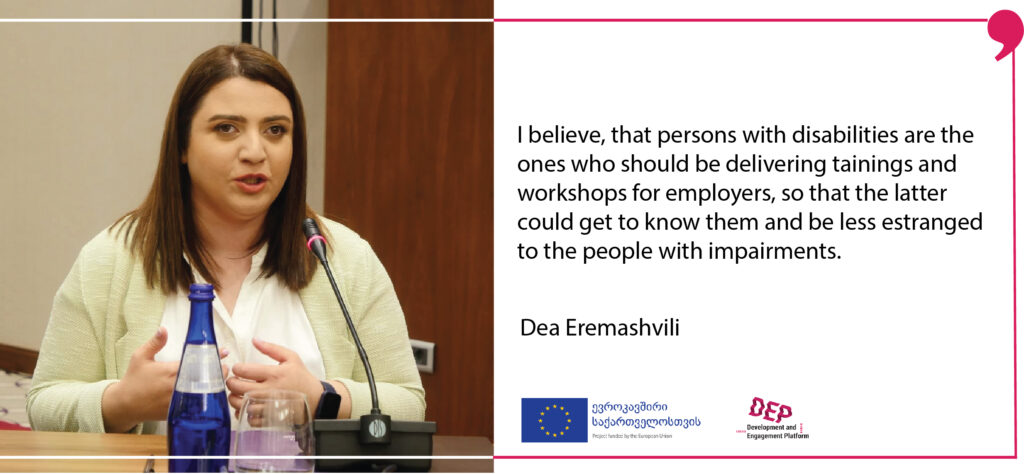In 2014, Georgia ratified the Convention on the Rights of Persons with Disabilities (CRPD), thus undertaking to support, protect and ensure the rights of the disabled. The Convention underlines that all persons with disabilities shall enjoy the right to fully participate in all aspects of life, including work and employment. Although Georgia has clearly declared its will to support all kind of involvement of the persons with disabilities, implementation of the rights of the latter still remains a great challenge for the country.

Dea Eremashvili is a disability rights advocate and activist, who for several years has been actively working on the issue of employment of people with disabilities. In this article, Dea will tell us on the situation in the country and the challenges faced by persons with disabilities.
Dea, your organization has been working towards the protection of the rights of people with disabilities and the promotion of their employment. Could you please share your experience, what are the challenges faced by people with impairments nowadays?
The obvious problem is that the majority of persons with disabilities who were born before 2000, especially those residing in rural areas, have had less opportunities and consequently, have no school diplomas. There were fewer resources at that time. There was a lack of inclusive education and no appropriate means of transport. To cap it all, there were power outages and poverty-stricken families. As a result, those people were left beyond the school. This is a problem nowadays, because those who failed to receive basic education do not have the appropriate qualifications to meet the labor market requirements. In addition, they are not entitled to enroll in vocational training programs.
What are the possible solutions to this problem?
As I have previously emphasized and I am still actively talking about it now, the cases of all those people need to be considered individually. I believe that the disabled born before 2000 should be allowed for discretion, based on which these people will be given the right to enroll in college. The present-day educational resources allow a person to actually change his/her life. Therefore, the state should greatly focus on those, who were unable to receive basic education. Today, these people are left ‘behind the scene’.
In addition, active work needs to be carried out in schools in terms of professional orientation. Most of the school-leavers do not proceed with their studies and either return home or attend a day care center. It is important that career planning consultants visit schools so as to convince children and their parents of the importance of getting education and acquiring a profession.
And also, it is very important that the assistance program be timely launched, so that people with mobility impairment could get to work or school without any problem. For example, there is a student girl, who cannot attend lectures because her parents work and have no time to ensure her transportation. In this case, it is vitally important that there be a disability assistant who will help them with transportation.
We should particularly focus on the accessibility of education for persons with disabilities. Of course, there are 3-month training courses available for the disabled, which they can undergo and even get a certificate. However, the majority of employers at the present-day labor market require higher education and short-term trainings are hardly suffice.
Dea, you have mentioned employers and their requirements. Given your activity, you have to continuously communicate and cooperate with them. What is the extent of their readiness and willingness to employ persons with disabilities?
Huge companies are more or less ready for that and they have been cooperating to some extent, but the middle-size companies still avoid it. This is probably due to a low level of awareness with regard to persons with disabilities. There are employers who simply don’t know the persons with disabilities and are unwilling to ‘shoulder that extra burden’. They believe, they are offered to employ a person who will be paid a salary for nothing and it will be just a waste of money.
Another problem on the present-day market is that the jobs that some employers offer to persons with disabilities are disproportionate in terms of remuneration and working conditions/workload. A salary is so low that it could hardly cover the food and transportation costs. I never offer such jobs to persons with disabilities, because no one is a slave.
What do you think should be done to improve the situation?
Although, I am not a great supporter of the quota system, I think Georgia is now at the stage where it will be appropriate to introduce temporary quotas for people with disabilities, as in the case of many countries. For example, there could be a 4% quota for the employment of persons with disabilities per 100 employees. This, in turn, will enhance persons’ motivation to get an education. In addition, some tax allowances could be introduced as an incentive for employers. A procedure for engagement in the state-run employment program shall be less bureaucratic.
In addition, employer awareness-raising trainings need to be actively conducted. I believe, that persons with disabilities should deliver trainings and workshops for employers so that the latter could get to know people with impairements better and be less estranged to the disabled.
Author: Tamar Zviadadze, Development and Engagement Platform
disclaimer
This article has been produced by Development and Engagement Platform, within the project “Promoting Employability of Youth with Disabilities” funded by the European Union under its Eastern Partnership Civil Society Fellowship Programme. Its contents are the sole responsibility of the author and do not necessarily reflect the views of the European Union.

